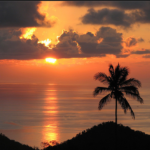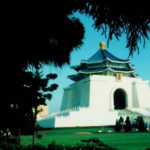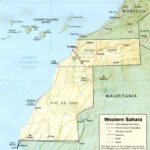LGBT Hong Kong today is alive and well with new faces, venues and activities as it adapts to Chinese rule since 1997. The Pink Dot gay festival and the LGBT film festival were undisturbed during the week of my visit.
By Richard Ammon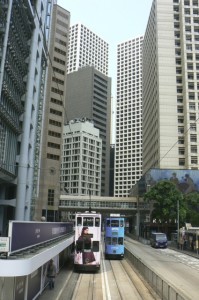
GlobalGayz.com
October 2015
Despite the tension with Beijing, Hong Kong still demonstrates its defiance and independent mindset—up to a point. A big loss for fair elections under the communist system happened when the ‘Occupy’ demonstrations shut down businesses in the central streets for almost three months in the fall of 2014: sit-in protests in Hong Kong involving mass civil disobedience began in September.
Widely known as the Umbrella Revolution, the protests began after the Hong Kong government proposed biased reforms in favor of pro-Beijing candidates. The proposal was widely seen to be highly repressive and unfair to favor the Communist Party control over independent candidates in the Hong Kong electorate process. Beijing stayed out of the front lines of action but kept a cautious eye on the massive crowds knowing eventually the Hong Kong government would shut down the protest, which it did after 70 days of defiant voices and publicity.
Life quickly went back to the usual bustle and hustle the next day, for the most part. A few die-hards held out for a couple of day with no effect on the city. Since then no public demonstrations have been seen in this city of just over seven million people.
Pink Dot
That is until September 20 of 2015 when about 15,000 people gathered peacefully in Tamar Park on Hong Kong Island (Admiralty district), far away from the dense central areas. This time there were no barricades or battalions of police (I think I saw two policemen off to the side).
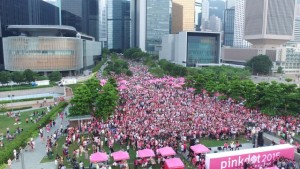 The event was the ‘Pink Dot’ celebration of love and peace, pink because it was actually a LGBT rally but it was not publicized as that in order to keep politics out of it. Pink Dot leader Gregory Wong said “Our theme this year is ‘Love is Love’. And that’s it, love IS love, across all genders.“
The event was the ‘Pink Dot’ celebration of love and peace, pink because it was actually a LGBT rally but it was not publicized as that in order to keep politics out of it. Pink Dot leader Gregory Wong said “Our theme this year is ‘Love is Love’. And that’s it, love IS love, across all genders.“
It was a polite playful celebration which included many expats from sevaral corporations and banks such as Morgan Stanley, Bank of America, HSBC, Goldman Sachs who gave out T-shirts, sunglasses, sweatbands, fans and water. There were speeches about human rights, women’s rights and equality, canto-pop singers and even some dancers to fill out the program. As the evening sky dimmed thousands of people dressed in pink shirts collected in a huge circle to create a human pink dot (best seen from drones overhead) to complete the day.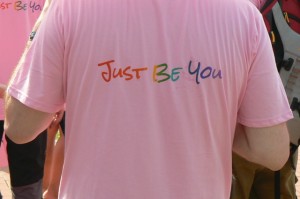
It appeared there were as many expats (straight and LGBT) as well as local Asians. By coincidence, the gathering happened on a Sunday which is the day off for tens of thousands of Filipina domestic workers (mostly women) who gather weekly in small friendship groups across the city for picnics and gossip on blankets spread on the ground. Little did they know about Pink Dot but they were not reactive to the thousands of LGBT pink-garbed folks gathered and the loud music and speeches from the stage with new skyscrapers in the background across the harbor. Some women even sported pink T-shirts as well (the shirts were free). Virtually all were unfazed by the crowd of LGBT celebrants (there is a considerable LGBT presence in the Philippines). Everyone was having a good time under the warming sun.
Later that night we joined other LGBTs seated in a cinema—one of many across town viewing dozens of films in the HK Gay and Lesbian Film Festival. This annual event was happening over the course 2 weeks (last week of September to first week of October). We went to only a screening to watch a too-long lesbian love story about two couples falling love. After the show the cast were present and were mobbed by fans. 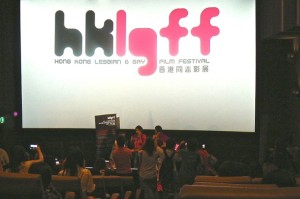 The film, one out of many, ‘Love You Baby’, was a Thai lesbian love story of 4 characters; slow moving and overacted with too many emotional facial stills that lingered but the actresses were quite pretty and one actually very handsome.
The film, one out of many, ‘Love You Baby’, was a Thai lesbian love story of 4 characters; slow moving and overacted with too many emotional facial stills that lingered but the actresses were quite pretty and one actually very handsome.
At The Beach
In another park of this vertical city, on the south side of HK island is the leafy suburb if Shek O, a big beach popular with straights and gays. In the village restaurants, expats, Chinese and Thai, friends clustered together for food, friendship and refreshments. On the clean sandy beach (no smoking allowed) families were playing with their kids and same-sex couples were soaking up the sun—all watched over by hunky lifeguards– who have gym weights in their station by the beach. 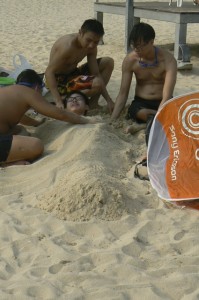 Nearby four young guys were busy burying one of them under a pile of sand as they giggled playfully. We stayed for a couple of hours then went back to the asphalt jungle.
Nearby four young guys were busy burying one of them under a pile of sand as they giggled playfully. We stayed for a couple of hours then went back to the asphalt jungle.
Back in town the Lan Kwai Fan area is a perpetual gathering mecca for gays and metrosexuals for drinks and dinner. Shopping malls seem to proliferate just as LGBT venues spread out, open and close. The old standbys Propaganda and Walley’s have been there for decades as popular bars and dance clubs.
I went to Propaganda bar in 1997 when the changeover from UK to China happened after a hundred year lease expired and UK’s Prince Charles and then Chinese general secretary Jiang Zemin presided over the flag-lowering and flag raising ceremony in the new convention center. At the time there was paranoia that China would disrupt the democratic governance in Hong Kong and gays would be under scrutiny. Inevitably the former has happened in subtle and obvious ways but the latter has not. The LGBT scene in Hong Kong has continued smoothly since the changeover. This capitalistic city continues to prosper and procreate; the are almost 8 million people here in a space 1/20th the whole state of Kansas (which has only 2 million people in the entire state).
Much of our weekend was spent with longtime friends Robin and his straight son, now 16 whom I had not seen since he was seven. They have lived in HK for many years. The boy goes to school here and is fluent in Cantonese Chinese as well as English.
Robin is a American college teacher and has known the LGBT scene for a generation as it has changed from pre-1997 British-run to the current Chinese territory. HK has always been more bold than mainland China because of the democratic British history. Today free enterprise is in full bloom with countless business companies that employ LGBT citizens and many LGBTs who own their own shops and companies.
Robin, in a later e-mail said: “as for the ‘gayborhood’, the community has found a new home in the Sheung Wan district. As most of Hong Kong’s nightlife has expanded north of Lan Kwai Fong onto Wyndham Street, Hollywood Road and in the SoHo area where all the restaurants have also moved to. The nightlife scene in Hong Kong has definitely matured in the last 10+ years. More locals are going out and the expat community is bursting at the seems. (photo left: Richard and Michael dining at the Peak restaurant.)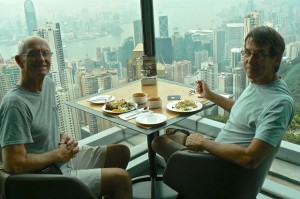
Part of the spillover has moved westwards into Sheung Wan, which used to be nothing but dried seafood stores. While they are still there, new neighbors include boutique high-rise hotels and serviced apartments. The gay community has also found a new home. On Jervois street you can find Volume/Beat, the busiest of bars which includes a small dance floor. Upstairs is Cafe Queen which has a street level entrance on Queen’s Road. Food is served here, and while you can find people dining in the early evening, not many would come here just for the food….. Also on the opposite side of Jervois Street is Zoo, a smaller bar which seems to be inhabited mostly by locals only during the evening rush hours.
Probably not at the behest of the managers, but Linq on Pottinger Street has pretty much turned out to be a gay bar most nights of the week. There are still the old standby’s such as Propaganda, but I haven’t been there for a while. Also up the hill is a trendy bar called Time, but there are usually more people congregating outside the bar because indoors can probably only fit about 15 people. Another bar called Wink gets quite a bit of coverage, and many otherwise straight bars have “gay nights”.
So that’s an update for October 2015. Gay rights activists are still pushing for anti-discrimination legislation; that will not happen soon, perhaps within a decade. Yet, much LGBT freedom exists here in the shadow of Communist China. In the major cities gay life in China itself is changing, loosening up, as the government sees the LGBT population does not threaten the political status quo and that queer folks are good for business.

